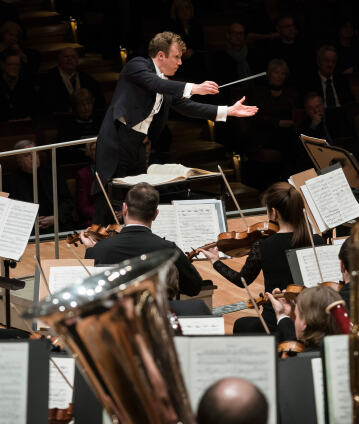Daniel Harding and Gerald Finley with works by Schubert and Strauss

Richard Strauss was not only a master of orchestration but an enthusiastic mountaineer as well. Thus, it is not surprising that in his last symphonic poem he depicted a hike in the Alps – vivid and haunting, with an endless palette of tonal colours. Conductor Daniel Harding and bass-baritone Gerald Finley also present familiar Schubert songs in rarely heard orchestral arrangements by Berlioz, Brahms and Reger.
Talking about his Alpensinfonie (Alpine Symphony), which was premiered in Berlin in October 1915, Richard Strauss said that he had “wanted to compose, for once, as a cow gives milk”. The work was actually originally intended to be a reflection on Strauss’s reading of Friedrich Nietzsche’s The Antichrist in classical four-movement form. However, while working on the score, Strauss took a step back from such lofty ambitions and created what he himself called a “naturalistic” one-movement symphonic poem. A keen walker in his free time, the work incorporates in particular the composer’s own experiences in the great outdoors.
The Alpine Symphony opens its series of musical episodes with a depiction of night, followed by a colourful instrumental portrayal of a sunrise. The hiker then sets off. From a distance, he hears the call of hunting horns, and he enters the forest. His walk takes him along a stream to a waterfall whose glittering refractions seem like mysterious phenomena. After crossing meadows full of flowers, the hiker reaches an Alpine pasture where he listens for a moment to the sound of cowbells before continuing his way through thicket and scrub to a glacier. Finally, after some perilous moments, he reaches the summit. On his descent, the hiker encounters a storm, but reaches home safely before the sun sets. The day ends peacefully, and night descends to the music of the opening.
Strauss elevates the ostensibly naive, inner action of the Alpine Symphony, probably based originally on an alpine experience from the composer’s youth, through his highly virtuoso orchestration, which involves the forces of around 130 musicians, and a refined network of motivic references. This compositional mastery would hardly be conceivable without Franz Schubert as a model. Having “worshipped, played, sung and admired” him since his early childhood, Strauss wrote about Schubert: “He could compose what he wanted, whatever his genius made him do.” Any comparison with the musical dairy cow may have its weaknesses, but it will be no less charming when, in this concert under the direction of Daniel Harding, Gerald Finley and the Berliner Philharmoniker precede the performance of the Alpine Symphony with a selection of Schubert songs in arrangements by late Romantics such as Johannes Brahms and Max Reger.
© 2018 Berlin Phil Media GmbH
Related interviews
Artists
Our recommendations
- “Pelléas et Mélisande” with Simon Rattle, Christian Gerhaher and Magdalena Kožená
- Simon Rattle conducts Mahler’s “Das Lied von der Erde”
- Sir Simon Rattle conducts a Mozart Gala at the 2005 New Year’s Eve Concert
- Simon Rattle conducts “Parsifal”
- Simon Rattle conducts Janáček’s “The Cunning Little Vixen”
- 2019 Europakonzert with Daniel Harding from the Musée d’Orsay, Paris